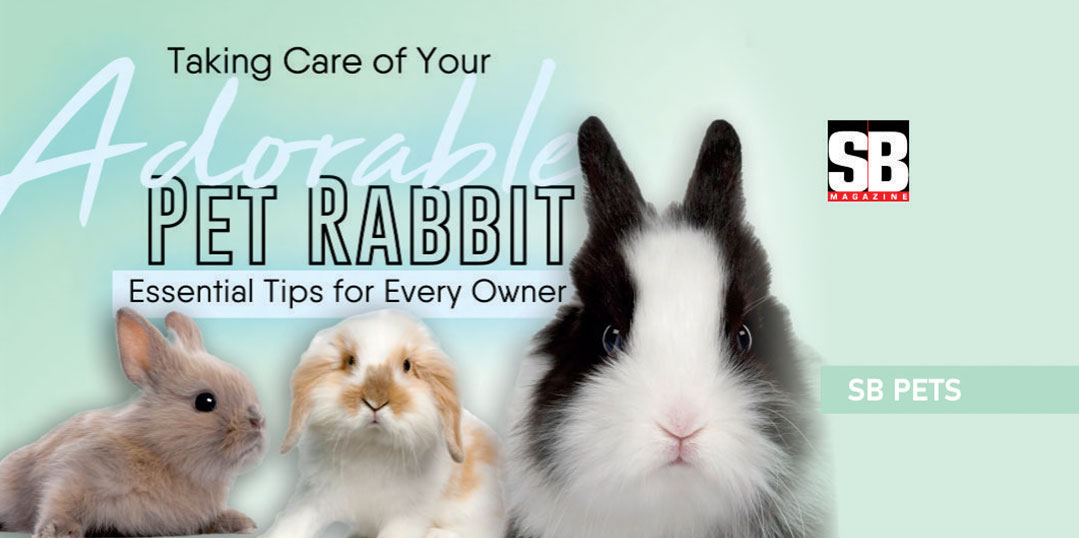Rabbits make wonderful house pets and offer endless joy to their owners. However, many new rabbit owners are not aware of the requirements for properly caring for their pets. This lack of knowledge often leads to preventable health issues in pet rabbits. It’s important to understand that, like any other pet, rabbits have specific needs that must be met to ensure they live a long, happy, and healthy life. If you’re a proud owner of a cute and furry pet rabbit or are considering adopting one, read on for helpful tips to get you started and ensure that your long-eared friend is always in top condition.
Tips for
Bunny-Proofing
Your Home
Domestic rabbits are happiest when kept indoors where they are protected and warm. House rabbits can move freely in a bunny-proofed room or rooms, or they can be kept in a puppy pen, bunny condo, or a large rabbit cage. It’s important to ensure that they have enough space to hop around and should be given time to exercise daily. Moreover, keeping your rabbit’s home in an area where it can interact with your family is recommended. The family or living room is an ideal location for their habitat.
Rabbits are natural chewers and love to explore their surroundings. Giving them ample space to run around is crucial, but it’s important to take precautionary measures to ensure their safety. Keep your rabbit away from electric cords, household chemicals, and houseplants that could be harmful. Bunny-proofing your home is the best way to protect your belongings and create a safe space for your bunny. You can cover electrical cords with flexible plastic tubing or lift them out of reach. Use plastic guards to safeguard your furniture and baseboards from being chewed on. Keep in mind that your rabbit will try to chew on just about anything within their reach.
Taking Care of Your
Rabbit’s Diet and Bathroom Needs
When it comes to a rabbit’s diet, it’s important to keep a few things in mind. A rabbit’s diet should mainly consist of hay and vegetables, with a few fruit treats every now and then. Make sure you do your research to determine which vegetables and fruits are safe for your rabbit. It is never a good idea to give a rabbit human processed food. Additionally, rabbit pellets are an option but should be supplemented with hay and fresh vegetables. Your bunny must always have access to fresh hay and water.
Rabbits generally have a natural inclination to pee and poop in one area. Be sure to set up a medium-sized cat litter box near their food and water bowls. Use a rabbit-safe, recycled newspaper pellet litter on the bottom of the litter box. Do not use cat litter or wood shavings; these are not safe for rabbits. To encourage good litter box habits, place a layer of hay on top of the litter. Rabbits like to eat hay and poop at the same time.
Tips for
Proper Rabbit Grooming and Care
Rabbits are naturally hygienic animals and clean themselves frequently, but they still require regular grooming. It’s essential to brush your bunny every day to remove excess fur, as it can cause severe digestive problems if ingested. Unlike cats, rabbits cannot cough up hairballs. Additionally, trimming your rabbit’s nails regularly is crucial to prevent them from curling and growing into their paws or getting caught on something.
Regular veterinary checkups are essential for keeping your bunny healthy. During these checkups, your vet will examine your rabbit’s ears, eyes, teeth, and gut to ensure that everything is in order. This will help keep your pet in the best possible condition and identify any early signs of illness. Additionally, consider having your rabbit spayed or neutered. This procedure can reduce aggressive behavior and improve litter box habits.
Rabbits are naturally social creatures that enjoy spending time with their human companions. Their lively and energetic nature is both infectious and entertaining. As caretakers, it’s our responsibility to ensure that our furry friends are content. By understanding how rabbits perceive the world around them, we can maintain their happiness and overall well-being.






